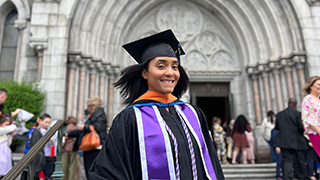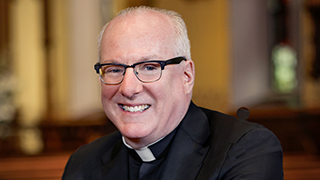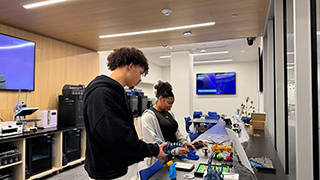Music and Theatre in the Time of COVID-19 - Seton Hall University
Monday, April 6, 2020

Tramm conducts the Seton Hall University Chorus and the Mid-Atlantic Symphony Chamber Orchestra in New York City in the Fall of 2018, as part of the Great Music at St. Bart's, a series sponsored by the Mid-Manhattan Performing Arts Foundation.
The effects of the COVID-19 global pandemic are far-reaching across every industry, and the arts are no exception. Music and theatre provide joy and comfort to people around the world in a variety of ways and formats. Two faculty members from the College of Communication and the Arts recently shared professional insights on how both the artists and audiences are coping and adapting given the recent theatre and concert hall closures.
Jason Tramm, Assistant Professor of Music commented on the ways musicians and audiences are dealing with the temporary inability to experience live music in a public setting. Tramm also discusses the potential silver linings we may see in the arts once the pandemic ends.
Q: Do you think the music industry will undergo a transformation as a result of the COVID-19 pandemic? Will we see a return to the days of packed concert halls and arenas, or will people retreat to the safety of their headphones?
Tramm: The return of "normal" functions and gatherings will take time but will occur. History is our greatest teacher and guide, as the bubonic plague racked Europe multiple times. Church and court functions had to be halted and life drastically altered. People came back and society went on to produce the Renaissance. I believe that this time of isolation and instability will result in an artistic explosion, as artists need to express what is inside.
In terms of classical music, or ensemble based music like choral and orchestral, there is no substitute or ability to create ensemble sound or cohesion. The issue of latency and sound quality seems to limit us all to soloists these days. As I view music as a unifying force, drawing in people to create something greater than the sum of the individual parts, the loss is deep and profound. While solo musicians at home can share their talents, I mourn the loss of ensemble music making in the most profound way. I guess this is a microcosm of our current world, technology gives us something for comfort, but can never have the simple power of a hug or basic physical contact. The same is true in music; a choir singing one phrase together has more power than all the solo recordings I have seen in the last weeks.
Q: What do you think of the recent trend of artists and performers bringing live shows to Facebook and Instagram Live? Do you think we will see artists embrace virtual concerts in the future, or is this a temporary byproduct of current circumstances?
Tramm: Any way that music can enrich people's lives should be embraced in these tumultuous times. Although the fidelity of these platforms is low and limited, it is wonderful that people are finding hope and beauty through these artists. Recorded music is a phenomenon only available around the turn of the 20th century, the ability to hear high quality performances on streaming audio has been crucial to my life during these times.
Nothing will replace the power of live music performed by musicians, as good as recordings and streaming performances can be. There is an energy and power that simply can't be transmitted electronically.
Gretchen Hall, Instructor of Theatre, provided commentary on how actors are affected by the recent closings, while also offering some advice to students and the community on how to embrace the quiet and keep yourself centered during these uncertain times.
Q: As an actor and theatre professional, what do you think the long-term impact theatre
closures might have on the industry?
Hall: So many of my professional acting colleagues are suddenly out of work, many offered
a few weeks' pay, despite having intentions of working much longer than that.
Actors are very resilient people. We will come out of this with more stories to tell. I think stories are the only way I am really getting through this quarantine. Watching films and television shows, reading books with my children and creating our own stories, going back to the origins of acting…there will be light on the other side of this.
Q: As acting entails the ability to control your emotions, your voice, your breath…are there any exercises that people can do to help decrease stress?
Hall: Turn off the news and don't check your phones. This isn't an acting exercise, but you need to give yourself the space to breathe and not be inundated with what is happening. I have found yoga and meditation have been very helpful. If you can focus on your breath as it enters and exits your body, rather than focusing on the news, you might find some relaxation.
Music and Theatre are undergraduate programs in the College of Communication and the Arts. Music majors may choose tracks in music performance, sound production and engineering, or musical theatre, or may work toward a certification in public school teaching by combining their major with a Secondary Education major through the College of Education and Human Services.
Categories: Campus Life






